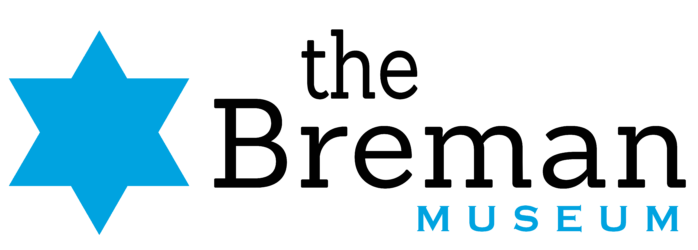

My request is:
Help your children become human. Your efforts must never produce learned monsters, skilled psychopaths or educated Eichmanns. Reading, writing, and arithmetic are important only if they serve to make our children more human.”
– An excerpt of a letter written by a Holocaust survivor to educators, published in “Teacher and Child” by Dr. Haim Ginott, child psychologist and author
Navigating the copious institutions that have dedicated themselves to preserving the history of the Holocaust can be a daunting task. Below is a list of recommended resources for students and teachers to continue learning about the history of the Holocaust and World War II.
For teachers, the Breman strongly recommends attending teacher training sessions. This is a complex, difficult subject matter, but there are many accessible professional development courses available. For more information, please contact the Holocaust education department of the Breman Museum.
The Breman Museum:
Title: Visiting the Museum
Link: https://www.thebreman.org/Visit/Group-Tours
Explanation: The Breman Museum is home the exhibition Absence of Humanity: The Holocaust Years 1933-1945, the only comprehensive overview of the Holocaust in the state of Georgia. School visits include gallery tours with trained educators and (when possible) opportunities to hear a Holocaust survivor tell his/her story in person. Meeting a survivor makes this history personal and relatable, and there are no clever digital solutions that come close to matching the power of that experience. Tours are available for students in grades 5 and up, and scholarships are available for qualifying institutions.
Title:. The Summer Institute for Teaching the Holocaust
Link: https://www.thebreman.org/Weinberg-Center/Summer-Institute
Short Explanation:
Each summer, the Breman Museum offers a 4-day seminar for educators that prepares them to effectively teach the complex history of the Holocaust. The course prepares educators in various grade levels and disciplines but is particularly focused on addressing the lessons’ incorporation into the Georgia Performance and Core Curricula Standards. Seminars are taught by renowned Holocaust educators from the USHMM, Yad Vashem’s International School for Holocaust Studies, the Anti-Defamation League (ADL), and local high schools and universities. The program includes daily presentations and discussion groups with Holocaust survivors.
Title: Cuba Family Archives for Southern Jewish History at the Breman Museum
Link: https://www.thebreman.org/Research/Cuba-Family-Archives
Short Explanation:
The Cuba Family Archives for Southern Jewish History at the Breman Museum is the largest and most complete repository for Jewish history in the Southeast and is the heart of the Breman Museum. The collection includes a significant amount of collections – which include oral histories, letters, artifacts, photographs – from Holocaust survivors who immigrated to the Atlanta area, many of whom are included in the New Lives online exhibit.
Additional Resources:
Title: United States Holocaust Memorial Museum
Link: https://www.ushmm.org/educators
Short Explanation:
The United States Holocaust Memorial Museum (USHMM) provides Holocaust education resources tailored for classroom use – films, lesson plans, and curricular materials. In addition, there is guidance on sound teaching strategies and information about professional development opportunities. USHMM’s Holocaust encyclopedia includes in-depth articles on over 800 topics. The USHMM website, available in sixteen languages, is the world’s leading online authority on the Holocaust.
Title:
Timeline of the Holocaust by Echoes and Reflections
Link: https://echoesandreflections.org/timeline-of-the-holocaust/
Short Explanation:
Echoes and Reflections is the leading resource for U.S. Holocaust educators. However, the Breman recommends that teachers undergo curriculum training to take full advantage of the curriculum. Designed in collaboration with the United States Holocaust Memorial Museum, the Anti-Defamation League, and Yad Vashem, Echoes and Reflections provides teachers with exemplary resources designed to meet U.S. curriculum standards and professional development courses.
However, their interactive timeline of the Holocaust is an excellent resource for exploring the chronology of this time period.
Title: The National World War II Museum
Link: https://www.nationalww2museum.org/students-teachers
Short Explanation:
The National WWII Museum is a dynamic educational resource, serving the needs of teachers and students from grade school through the post-graduate level. USA Today gave the Museum its top rank as one of the “Best Places to Learn U.S. Military History." Exhibitions and programs, including online exhibitions, distance learning initiatives, and research introductions aimed specifically for students, allow students from all backgrounds to explore the values and beliefs—the universal concepts—that Americans and their Allies embraced during World War II.
Title: USC Shoah Foundation
Link:
https://sfi.usc.edu/teach_and_learn/for_educators
Short Explanation:
The USC Shoah Institute offers a variety of programs and resources for teachers. From downloadable lessons that are classroom ready to documentary films and professional development programs, their resources are helping teachers use testimony in their classrooms around the world.
Whether the Institute is offering a digital lesson plan, a 90-minute seminar, or a week-long training session, its professional development programming focuses on how to tap into the potential of testimony to achieve cognitive and affective learning in students. The Institute’s focus is on broad universal learning outcomes and their relevance to today’s youth, rather than a specific historical or disciplinary focus.
Title: Yad Vashem, The World Holocaust Remembrance Center
Link: https://www.yadvashem.org/education.html
Short Explanation:
Yad Vashem’s International School for Holocaust Studies trains educators to teach the Holocaust, develops multi-disciplinary, pedagogic tools, and maintains the largest collection of archival documents related to the Holocaust in the world. Their educational videos are excellent additions to a lesson plan.
Title: Jewish Partisan Educational Foundation
Link: http://www.jewishpartisans.org/what-is-a-jewish-partisan
Short Explanation:
The Jewish Partisan Educational Foundation (JPEF) develops and distributes effective educational materials about the Jewish partisans and their life lessons, bringing the celebration of heroic resistance against tyranny into educational and cultural organizations. JPEF has produced a comprehensive and thought-provoking curriculum called RESIST, designed to transmit the enduring understandings arising from the stories of the Jewish partisans. RESIST is designed for 6th – 12th grade students in formal and informal settings. JPEF also offers E-learning courses for educators.
